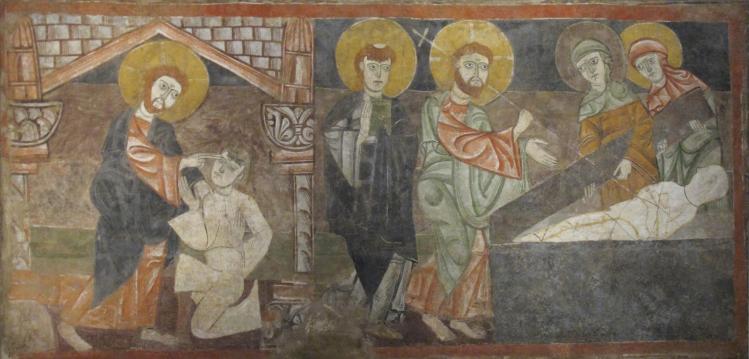
Today, if we were all in the parish gathered together, you’d be hearing the second of three great gospel passages from John that are read this time of year: last week, the woman at the well (John chapter 4); this week, the healing of the man born blind (John chapter 9); and next week, the raising of Jesus’s friend Lazarus from the dead (John chapter 11). If you are looking for scripture passages to spend time with during these difficult days, you couldn’t do much better than these.
We read these stories during Lent because they are all stories about transformation—people experiencing dramatic change and even liberation. And during Lent, that is what we are all after, a sense that something new is possible for us, something that frees us from whatever we need to leave behind.
But what we also see in these stories is that transformation isn’t easy. There is no change without saying goodbye to something. We can’t rise to something new without first dying to the old.
Even this story of the blind man, who is healed by Jesus without even asking for it, shows that change has unintended consequences. When you read this gospel, you realize that the healing itself only takes up about the first ten percent of the story; the rest is about all the side effects of someone being healed. Look at how complex life becomes for this man. Suddenly, people are even arguing about whether he is the same person he was before; and of course, in a way he isn’t. His own parents aren’t sure they want to be on his side. Everyone wants to know what happened and why it happened.
And this healing doesn’t bring nearly as much rejoicing as you would think it should. Sure, the man’s life has been changed for the better, since he can now see, but his life has also been turned upside down. He wasn’t just healed—his future is now headed in a new direction that he never planned on, and maybe not such an easy direction. And it all happens because that is what Jesus wants: people putting aside the burdens of their past lives in order to follow him, to see the light and go somewhere new even if beginning that new path is hard.
Right now the need for healing is on all of our minds. We’re confronted with fears and challenges we’ve never faced before, we’re all very anxious, and it’s fair for us to ask God what’s going on. The disciples ask Jesus, who made the blind man blind in the first place, and why? We could ask, who made this virus, and why? Is all this happening to punish us? Or is it just a random event that God doesn’t care much about?
Jesus makes it clear in this gospel that isn’t what’s going on. The blind man is blind, Jesus says, so that the works of God might be shown forth in him. That is why everyone and everything is here on this earth—to show the glory of God. This man is blind so that we can see what happens when God touches someone. He is blind so that we can remember that God created this world out of love for the fragile people like us he has placed here, that human weakness is precious to God. The work of God is to bring light out of darkness. And that is our work, too—in times of fear and darkness to see the light, to bring light to others, and to remember that the light is always around us.
We’re all on an unexpected and unwanted Lenten retreat right now, and it’s not one we would have planned. Our usual lives have been taken away for a while, and we’re focused on what really is next for us and the people we love. We all feel like we’re operating in the dark, like the blind man. But we want new life to come out of this, and where that will come from is not always easy to see. And yet God is still there. The first day of spring has still arrived even in the midst of fear and death. New life is there if we want it, even now—it’s not always easy to see the light in the darkness, but somehow, if we ask, God will show us that the light is always coming.
